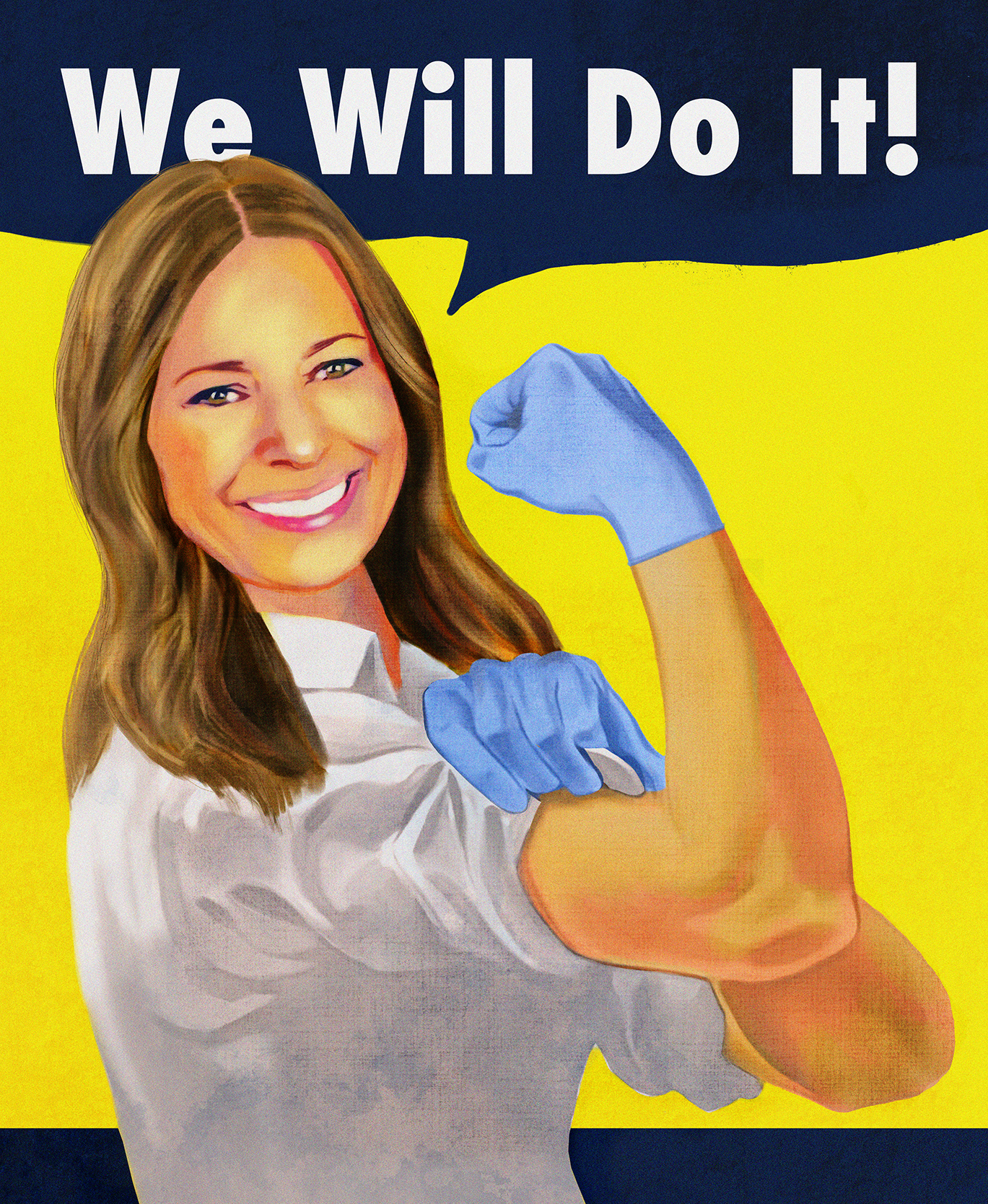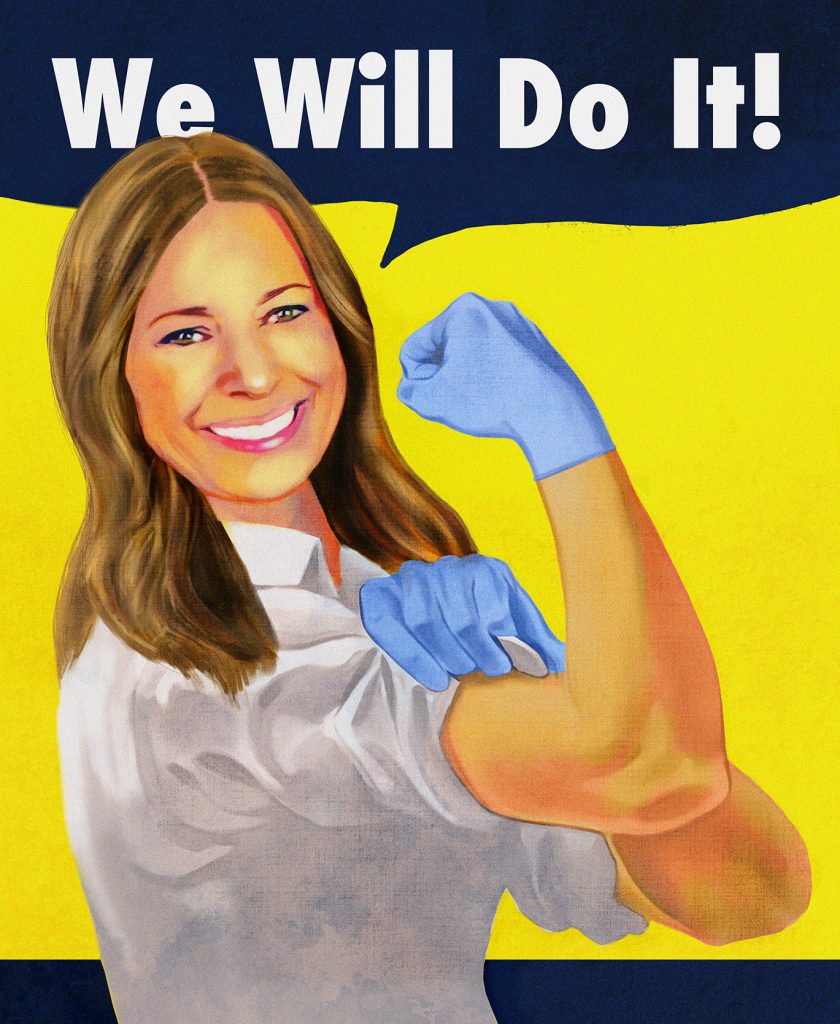We Will Do It: Dr. Amy Acton is determined, not afraid

The announcement was shocking, even to the pool of hardened reporters gathered in anxious anticipation. On March 12, Ohio Governor Mike DeWine ordered the closure of all schools in the state for at least three weeks to hopefully halt the spread of the novel coronavirus, also known as COVID-19.

With only a handful of confirmed cases, based largely on statistical models and patterns emerging from cities and countries around the world, Ohio was among the first to signal, almost prophetically, that life as we all knew it was about to change dramatically, perhaps forever.
Then skepticism suddenly turned to stunned silence as Ohio Department of Health Director Dr. Amy Acton stepped forward to reveal the possibility that more than 100,000 Ohioans were already carrying the virus.
But this dire presumption wasn’t delivered with cold calculation by a career bureaucrat who dithers or withers in front of the cameras. Instead, Acton did something remarkable, in real time. In her signature white coat and without a whiff of wonk, she calmly and confidently broke down the math behind the decision and the prediction, at one point comparing the delay in reliable data to the light of a distant star whose brightness we can only see long after the moment has passed.
And with that, Ohioans discovered the light of a different kind of star, and her moment is now.
BROUGHT TO YOU BY
Even before Acton was a household name, she was already an unlikely hero. A physician since 1994, she honed both her approachable bedside manner and public policy persona at Nationwide Children’s Hospital and as an assistant professor at Ohio State. During her brief tenure at The Columbus Foundation, Acton was instrumental in raising nearly $2.5 million in just six weeks to combat youth homelessness, blowing past every expectation. It was a philanthropic success that was also hauntingly personal.
It isn’t without irony that as Ohio businesses close their doors, many for the last time, that Youngstown’s venerated daily newspaper, The Vindicator, published its final edition this past August with an intimate portrait of Acton. Then, she was still the local homecoming queen who had beaten the odds, gone on to college, ultimately becoming the top public health official in the state.
The “grit and grace” we see today, so noted by Doug Kridler, President and CEO of The Columbus Foundation, was undeniably born of a chaotic, often tragic, childhood. Acton’s parents separated when she was just three, and in the decade that followed before reuniting with her father, she lived in a constant state of uncertainty. This included living in more than a dozen places in as many years across the country, some less desirable than others; she lived once in an unfinished basement, and even spent a winter in a tent. Only after abuse at the hands of one of her mother’s string of boyfriends did life for Acton finally start to turn around. Her father was granted full custody, and she’s never seen her mother again.
But even this backstory only surfaced in retrospect. The newspaper’s website also shut down a day after the final edition hit the streets. No likes, shares, or tweets. Only later were the archives posted online, with that closing interview receiving overdue attention in recent weeks, much like Acton herself.
“Lots of powerful souls walk among us,” noted Todd Franko, former Editor in Chief of The Vindicator. “Last August, she walked in and walked out of our office, and no one knew her. They know her now.”
Yet in darkness, there is still light, with dutiful denizens across the state tuning in daily for afternoon “Wine with DeWine.” But even that fierce following may pale in comparison to the more than 50,000 members of Acton’s entirely unofficial Facebook fan club. The conversation waxes and wanes from harrowing accounts to rays of revelry, from the testimonials of healthcare providers on the frontline of the crisis to heated debate about which actress should portray Acton in some future Hollywood feature. (For those keeping score, Allison Janney, Dana Delany, and Anne Hathaway are currently the top casting contenders.) Local apparel company Homage also honored her with a t-shirt emblazoned with the words, “Not all heroes wear capes.”
Even Acton herself is not above public levity amid unprecedented circumstances. A photo from a recent morning meeting in the lower level of the statehouse went viral, with staffers seemingly orbiting a laughing Acton from a safe social distance. It was a rare and candid glimpse of the loyalty she fosters among the small army she inspires, no longer
in anonymity.
Her candor coupled with compassion is at the heart of her appeal. The mother of six, one of whom offers her his own daily briefings on her online following from his home in Menlo Park, has been called “Ohio’s Mom” for the tough love that belies every escalating restriction that unfolds aimed at minimizing the worst case scenarios.
It’s the same honesty tempered with hope that won DeWine over barely a year ago. Acton neither sought nor expected to become the governor’s final, perhaps his most crucial, cabinet selection. In discussing the role with him, she offered an unvarnished, apolitical assessment of Ohio’s challenges and opportunities to improve public health, and prepare for unforeseen threats to it.
Thankfully, he hired her anyway.
The hasty cancellation of in-person voting the day before the state’s primary and extension of absentee voting by mail was deemed politically untenable, until it wasn’t. After what was expected to be an uncontested delay erupted into a last-minute legal reversal, Acton’s authority to protect citizens in the midst of a public health emergency found precedent in an obscure provision of the Ohio Revised Code from 1886 in response to an outbreak of tuberculosis.
Now, Ohio leads the country in its response, with fellow states following suit, though not without criticism. The impact on businesses directly and indirectly is as controversial as it is unavoidable. DeWine is charged with an impossible task, desperately trying to land a plane safely, despite the fact that it’s coming apart in the air. There will be casualties, actual and economic. But reducing the former requires increasing the latter. Acton is not only his copilot, but is additionally charged with assuring passengers that they are doing everything they can just
to survive.
This is why we need Acton right now—she’s a guiding star in what often seems like an endless night. When human nature and history tend to suggest turning on each other, she’s quick to remind us that we’re all in this together. She’s the hero we didn’t know was in our midst, the same powerful soul who walked up to a podium and into our lives barely a month ago practically unknown, but who is now a part of our daily routine. When all of this is behind us, we’re going to look back on how we have changed. And when that day comes, we will surely have Acton to thank for telling us exactly what we needed to hear, when we needed to hear it, just to get through another day. We should all be forever grateful for her words.
“I don’t want you to be afraid. I’m not afraid. I am determined,” Acton famously confessed. “All of us are going to have to sacrifice. And I know someday, we’ll be looking back and wondering what was it we did in
this moment.”
BROUGHT TO YOU BY




